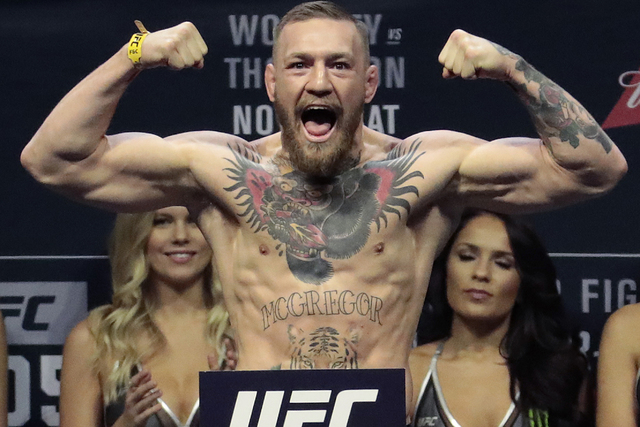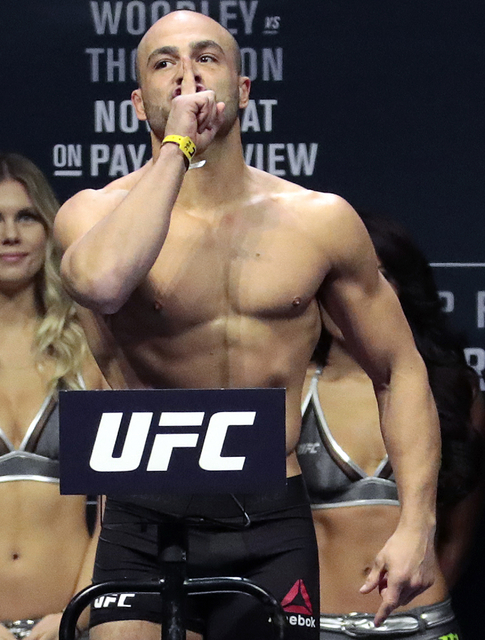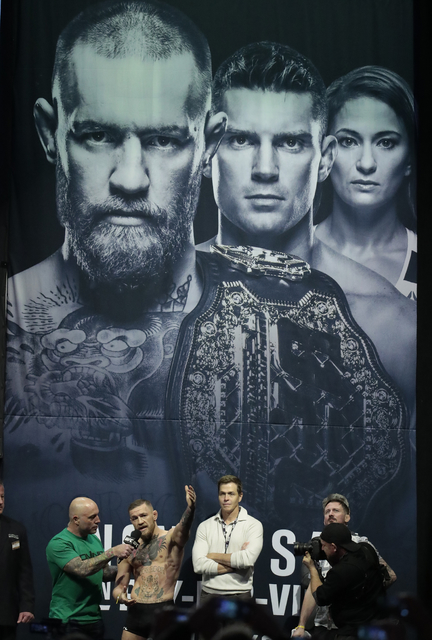UFC debuts in New York after decades of delays



NEW YORK — It has been just two months since the card for UFC 205 was announced.
In reality, the event has been almost two decades in the making.
Even bombastic UFC President Dana White admits he might get a bit emotional Saturday once fans start filing into Madison Square Garden.
After years of political grappling, the UFC finally hits the Big Apple.
“Madison Square Garden is probably the most famous arena on earth,” White said. “I rarely take a moment to just take it all in because we’re going so fast all the time, but you better believe I will on Saturday night.”
Mixed martial arts has come a long way since former New York State Athletic Commission Chairman Randy Gordon was called before the state’s Legislature to share his opinion on the rising sport of no-holds-barred fighting in 1997. He left no doubt about where he stood.
“I told them, ‘If you sanction this, there will be blood in New York and it will be on your hands, not mine,’” Gordon remembered.
Not surprisingly, after hearing such a powerful rebuke from the man who had formerly run one of the oldest boxing commissions in the nation, the Legislature enacted rules banning professional mixed martial arts fights.
As more rules were adopted and the sport evolved to where it is today, as a fully regulated mainstream success story, Gordon changed his mind. It’s easier to change one mind than a law, however, and the ban stayed in place for nearly 20 years despite a decade-long lobbying effort that cost Las Vegas-based UFC millions of dollars.
“In those first events, it truly was a street fight without a beer bottle,” he said. “Then as they got into it, they brought in all the martial arts and they seemed to be much more important to the competition than the initial brawling. I liked that. I don’t think I’ve ever missed another UFC event.”
VINDICATION IN NEW YORK
Former middleweight champion Chris Weidman, the only New York native on the UFC 205 card, will likely share a similar experience. He has memories of jumping on the train near his home on Long Island and riding into events at the Garden. He has a particular fondness for the time his uncle took him, his brother and sister to the circus at the arena.
Yet, despite being one of the top fighters in the world, his job was technically illegal in his home state. It’s one of the reasons it was so important to help with lobbying efforts over the last several years.
He spoke to legislators each session and even took a bus tour around the state to help rally support for the legalization of the sport.
“Every year, every person I talked to would just say, ‘Oh, this is the year.’ It just never happened,” he said. “I kind of gave up hope. In my mind, I just wrote it off as dirty politics. Then, a couple people got arrested and some things got cleaned up and the next thing you know, we’re here. It just feels surreal, man.
“I just feel like it’s so huge for me. It’s important to me, my fans, my family, my friends.”
Weidman was referring to Sheldon Silver, the speaker of the New York State Assembly from 1994 until his arrest and conviction on corruption charges in 2015. He was often held up as the villain by the state’s proponents of mixed martial arts.
It was long believed there were enough votes in the Assembly to legalize MMA in New York. The state Senate passed such a bill each year, but Silver would not allow a vote in the Assembly. The battle went far beyond the walls of the octagon.
The UFC was owned by Frank and Lorenzo Fertitta, who also owned non-union Station Casinos. Their local battle with Culinary Local 226 was taken up by the union’s powerful national organization UNITE HERE, which is based in New York.
Union influence on Silver was long blamed for the holdup in getting an MMA bill passed.
MORE THAN UNIONS
Stephen Koepfer, a New York City gym owner and the founder of the Coalition to Legalize MMA in NY, says it wasn’t that simple. He points out that not only was there a lack of education about the sport among the legislators, but even the Catholic Church was speaking out against bringing the sport to New York.
“I think it was a lot more fluid. It’s easy to say it was just the union because it’s easy to create a scapegoat,” he said. “But this was a much more delicate problem to solve that I think over the years shifted.
“There was a lot of hostility with the grass-roots people here that it wasn’t an MMA problem, it was just about New York becoming a proxy battleground for this other battle that was happening in Vegas over unionizing of casinos.”
Koepfer was frustrated at times that even the politicians who spoke out in favor of legalizing MMA did so on the basis of how much money UFC events could bring to the economy.
He points out the ban had a far greater impact on young fighters who were trying to get started in their careers than on those who had already made it to the big leagues.
“For early pros, selling tickets is a big part of their income and they had trouble doing that because they couldn’t fight at home and the purses are so low,” Koepfer said. “Even a fight in Atlantic City is (more than a 2-hour) drive. Only the most hard-core of our fans would make the trip.”
When the bill was finally signed this year, Koepfer was happy to see his mission finally reach a successful conclusion.
He was also relieved.
“Every June after the legislative calendar ended, I’d be like … I’m done. Somebody else can pick up the gloves. I don’t want to do this anymore,’” Koepfer said. “I seriously tried to back away, but it was impossible. I felt like Pacino in ‘The Godfather,’ you know? Every time I try to get out, they pull me back in.
“That (bill-signing) was awesome. That’s when I finally said, ‘OK, I can actually step away.’ Let other people address the new battles that have to happen and there are new battles that have to happen regarding regulation of amateurs in New York. But other people can do it.”
Koepfer won’t attend the event at Madison Square Garden. It’s the hottest ticket in town. Gordon won’t be there either, though he’s unhappy he’s missing it. He has a family commitment that can’t be broken, but he calls UFC 205 the biggest sporting event at Madison Square Garden since the 1971 “Fight of the Century” between Muhammad Ali and Joe Frazier.
“Everybody is talking about this. It has been a long time coming and I, as the guy who helped ban it, couldn’t be happier,” Gordon said. “There’s never, ever been a moment where I doubted turning it down and going to the Legislature.
“Sometimes I wish things could have been different (in recent years), but it was out of my hands at that point.”
Saturday night, there most likely will be blood in New York. And Gordon is just fine with it.
Contact Adam Hill at ahill@reviewjournal.com or 702-277-8028. Follow @adamhilllvrj on Twitter.












